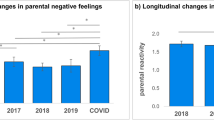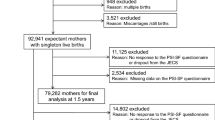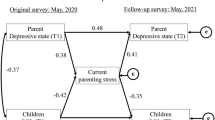Abstract
With the aim of assessing parental stress after SCT, 73 parents of children and adolescents who underwent SCT 5 or 10 years ago responded to questionnaires on general distress (General Health Questionnaire (GHQ)), disease-related stress (Pediatric Inventory for Parents-short form (PIP-SF)) and perceptions of child vulnerability (Child Vulnerability Scale (CVS)). General distress scores were comparable with the reference groups, but 40% of the mothers at 5 years after SCT reported increased stress levels as compared with 26% in the community-based reference group. Disease-related stress was comparable with the reference group of parents of children who were just off cancer treatment, 5 years after SCT. At 10 years after SCT, scores were lower than the reference group. Perceived child vulnerability did diminish over time, but remained high in parents of SCT survivors, compared with parents of healthy children: 96% of the parents at 5 years after SCT and 76% of the parents at 10 years after SCT scored above the cutoff point. Perceived vulnerability was found to be a predictor for parental disease-related stress. To conclude, although most parents of SCT survivors are resilient, the majority of parents perceive their child to be much more vulnerable as compared with parents of healthy children. This perception is associated with disease-related stress and may induce overprotective parenting.
This is a preview of subscription content, access via your institution
Access options
Subscribe to this journal
Receive 12 print issues and online access
$259.00 per year
only $21.58 per issue
Buy this article
- Purchase on Springer Link
- Instant access to full article PDF
Prices may be subject to local taxes which are calculated during checkout

Similar content being viewed by others
References
Leiper AD . Non-endocrine late complications of bone marrow transplantation in childhood: part I. Br J Haematol 2002; 118: 3–22.
Leiper AD . Non-endocrine late complications of bone marrow transplantation in childhood: part II. Br J Haematol 2002; 118: 23–43.
Bresters D, van Gils ICM, Kollen WJW, Ball LM, Oostdijk W, van der Bom JG et al. High burden of late effects after haematopoietic stem cell transplantation in childhood: a single-centre study. Bone Marrow Transplant 2010; 45: 79–85.
Phipps S, Dunavant M, Lensing S, Rai SN . Patterns of distress in parents of children undergoing stem cell transplantation. Pediatr Blood Cancer 2004; 43: 267–274.
Phipps S, Dunavant M, Lensing S, Rai SN . Psychosocial predictors of distress in parents of children undergoing stem cell or bone marrow transplantation. J Pediatr Psychol 2005; 30: 139–153.
Manne S, DuHamel K, Ostroff J, Parsons S, Martini DR, Williams SE et al. Coping and the course of mother's depressive symptoms during and after pediatric bone marrow transplantation. J Am Acad Child Adolesc Psychiatry 2003; 42: 1055–1068.
Vrijmoet-Wiersma CMJ, Kolk AM, Grootenhuis MA, Spek EM, Klink van JMM, Egeler RM et al. Child and parental adaptation to pediatric stem cell transplantation. Supp Care Cancer 2009; 17: 707–714.
Forinder U . Bone marrow transplantation from a parental perspective. J Child Health Care 2004; 8: 134–148.
Thomasgard M, Metz WP . The vulnerable child syndrome revisited. J Dev Behav Pediatr 1995; 16: 47–53.
Thomasgard M, Metz WP . Parental overprotection and its relation to perceived child vulnerability. Am J Orthopsychiatry 1997; 67: 330–335.
Colletti CJ, Wolfe-Christensen C, Carpentier MY, Page MC, McNall-Knapp RY, Meyer WH et al. The relationship of parental overprotection, perceived vulnerability, and parenting stress to behavioral, emotional, and social adjustment in children with cancer. Pediatr Blood Cancer 2008; 51: 269–274.
Mullins LL, Wolfe-Christensen C, Hoff Pai AL, Carpentier MY, Gillaspy S, Cheek J et al. The relationship of parental overprotection, perceived child vulnerability, and parenting stress to uncertainty in youth with chronic illness. J Pediatr Psychol 2007; 32: 973–982.
Manne S, DuHamel K, Ostroff J, Parsons S, Martini DR, Williams SE et al. Anxiety, depressive, and posttraumatic stress disorders among mothers of pediatric survivors of hematopoietic stem cell transplantation. Pediatrics 2004; 113: 1700–1708.
DuHamel KN, Manne S, Nereo N, Ostroff J, Martini R, Parsons S et al. Cognitive processing among mothers of children undergoing bone marrow/stem cell transplantation. Psychosom Med 2004; 66: 92–103.
DuHamel KN, Rini C, Austin J, Ostroff J, Parsons S, Martini R et al. Optimism and life events as predictors of fear appraisals in mothers of children undergoing hematopoietic stem cell transplantation. Psychooncology 2007; 16: 821–833.
Streisand R, Braniecki S, Tercyak KP, Kazak AE . Childhood illness-related parenting stress: the pediatric inventory for parents. J Pediatr Psychol 2001; 26: 155–162.
Vrijmoet-Wiersma CMJ, Hoekstra-Weebers JE, Peinder de WMG, Koopman HM, Tissing WJE, Treffers PDA et al. Psychometric qualities of the Dutch version of the pediatric inventory for parents (PIP): a multi-center study. Psychooncology 2009 (e-pub ahead of print).
Koeter MWJ, Ormel J . General Health Questionnaire, Dutch Manual. Swets & Zeitlinger: Lisse, 1991.
Vance Y, Morse RC, Jenney ME, Eiser C . Issues in measuring quality of life in childhood cancer: measures, proxies, and parental mental health. J Child Psychol Psychiatry 2001; 42: 661–667.
Wijnberg-Williams BJ, Kamps WA, Klip EC, Hoekstra-Weebers JE . Psychological distress and the impact of social support on fathers and mothers of pediatric cancer patients: long-term prospective results. J Pediatr Psychol 2006; 31: 785–792.
Forsyth BWC, Horwitz SM, Leventhal JM, Bruger J, Leaf PJ . The child vulnerability scale: an instrument to measure parental perceptions of child vulnerability. J Pediatr Psychol 1996; 21: 89–101.
Pijzel M, Last BF, Houtzager BA . How vulnerable do parents perceive their children to be? (in press).
Norberg AL . Burnout in mothers and fathers of children surviving brain tumour. J Clin Psychol Med Settings 2007; 14: 130–137.
Helfricht S, Latal B, Fischer J, Tomaske M, Landolt MA . Surgery-related posttraumatic stress disorder in parents of children undergoing cardiopulmonary bypass surgery: A prospective cohort study. Pediatr Crit Care Med 2008; 9: 217–223.
Lof C, Forinder U, Winiarski J . Risk factors for lower health-related QoL after allogeneic stem cell transplantation in children. Pediatr Transplant 2007; 11: 145–151.
Forinder U, Lof C, Winiarski J . Quality of life following allogeneic stem cell transplantation, comparing parents’ and children's perspective. Pediatr Transplant 2006; 10: 491–496.
Anclair M, Hoven E, Lannering B, Boman KK . Parental fears following their child's brain tumor diagnosis and treatment. J Pediatr Oncol Nurs 2009; 26: 68–74.
Koocher GP, O’ Malley JE . The Damocles Syndrome. Psychosocial Consequences of Surviving Childhood Cancer. McGraw Hill: New York, 1981.
Acknowledgements
We thank all participating families for their willingness to cooperate in this study. Furthermore, we thank graduate students Marjolein Littooij and Renée Elaine Veldhuis for their contribution to this research project.
Author information
Authors and Affiliations
Corresponding author
Ethics declarations
Competing interests
The authors declare no conflict of interest.
Appendix
Rights and permissions
About this article
Cite this article
Vrijmoet-Wiersma, C., Egeler, R., Koopman, H. et al. Parental stress and perceived vulnerability at 5 and 10 years after pediatric SCT. Bone Marrow Transplant 45, 1102–1108 (2010). https://doi.org/10.1038/bmt.2009.309
Received:
Revised:
Accepted:
Published:
Issue Date:
DOI: https://doi.org/10.1038/bmt.2009.309
Keywords
This article is cited by
-
Health-Related and Economic Burden Among Family Caregivers of Patients with Acute Myeloid Leukemia or Hematological Malignancies
Advances in Therapy (2021)
-
Parent proxy assessment of sibling quality of life following pediatric hematopoietic cell transplantation
Health and Quality of Life Outcomes (2019)
-
Health-Related Quality of Life and Emotional Health in X-Linked Carriers of Chronic Granulomatous Disease in the United Kingdom
Journal of Clinical Immunology (2019)
-
The impact of pediatric blood and marrow transplant on parents: introduction of the parent impact scale
Health and Quality of Life Outcomes (2015)
-
Health related quality of life and parental perceptions of child vulnerability among parents of a child with juvenile idiopathic arthritis: results from a web-based survey
Pediatric Rheumatology (2014)



